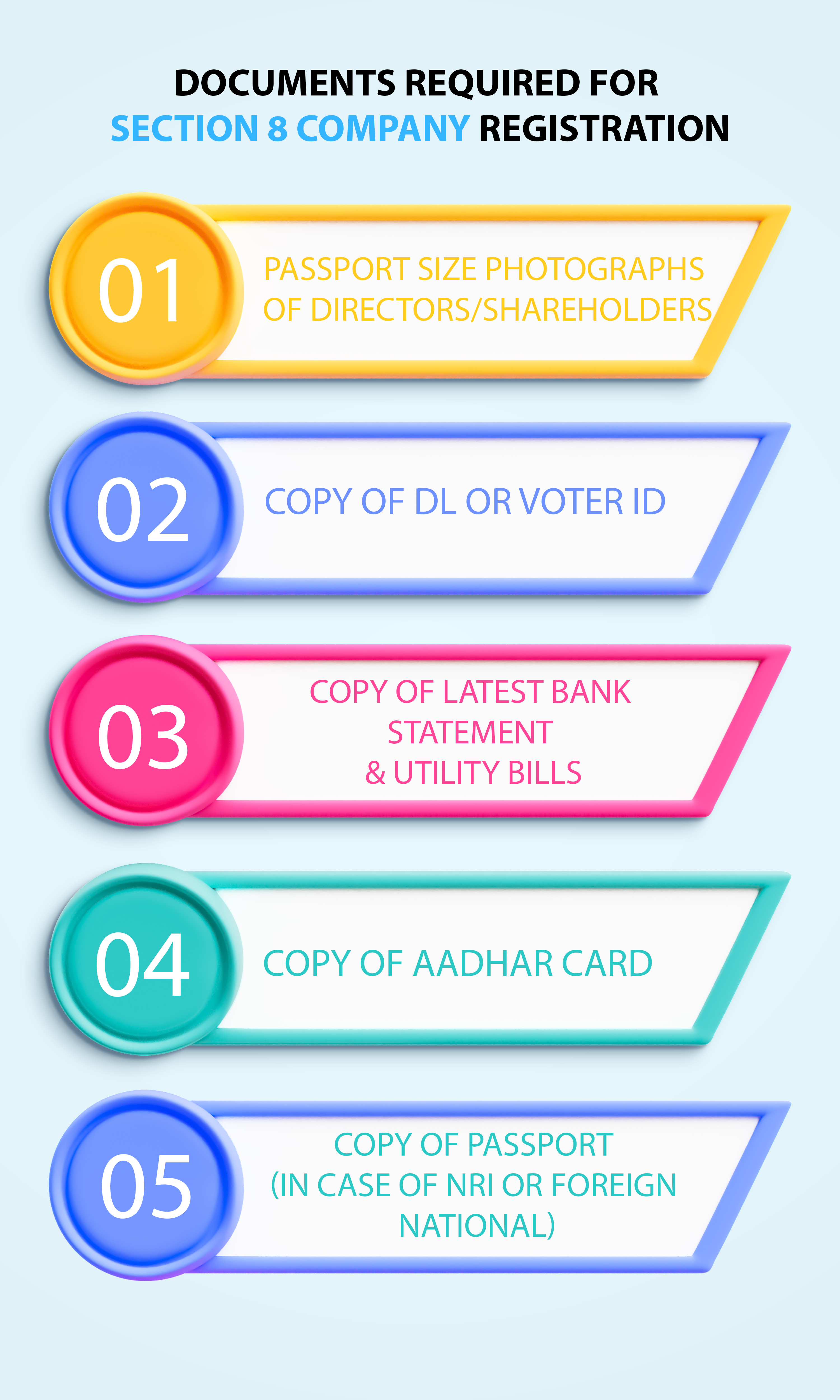An Overview of Section 8 Company Registration
In India, a Section 8 Company operates as a non-governmental organization (NGO)
committed to promoting various fields such as art, science, education, sports, and
charitable initiatives. Unlike Trusts or Societies, any profits generated by a
Section 8 Company are reinvested to further its objectives rather than being
distributed among its members. The registration of a Section 8 Company falls under
the Ministry of Corporate Affairs (MCA), setting it apart from Trusts and Societies,
which are regulated by State Government Registrars.
Choosing AICE Startup Advisor for Section 8 Company registration offers significant
advantages over Trusts and Societies. The Section 8 framework enhances credibility
with government authorities, stakeholders, and potential donors. At AICE Startup
Advisor, our skilled team ensures a hassle-free registration process, handling
documentation, application filing, and incorporation with expertise. We streamline
the process, making it smooth and efficient for you.

Important Points Regarding Section 8 Company in India
Here are some key points regarding Section 8 Companies in India:1. NGOs in India can be registered either under the Registrar of Societies or as a Non-Profit entity under Section 8 of the Companies Act, 2013.
- 2. Section 8 Companies must comply with the Companies Act, which includes filing returns with the Registrar of Companies (ROC), maintaining proper books of accounts, and adhering to GST and Income Tax Act regulations.
- 3. The profits of a Section 8 Company cannot be used for any purpose other than its charitable objectives and cannot be distributed among its shareholders.
- 4. Any modifications to the Charter Documents, such as the Articles of Association (AoA) and Memorandum of Association (MoA), require prior approval from the Government.
- 5. Section 8 Companies are the modern equivalent of the former Section 25 Companies under the Companies Act, 1956, and continue to be recognized under the current legislation.
Advantages of Section 8 Company Registration in India
Here are some advantages of Section 8 Company Registration in India:1. Separate Legal Entity: In India, these companies are recognized as separate legal entities, allowing them to own property, initiate or face legal proceedings in their name, and enter into contracts.
2. Enhanced Trust & Credibility: Due to their non-profit nature, Section 8 Companies are generally perceived as more credible and trustworthy compared to other types of companies.
3. Exemption from Stamp Duty: These companies are not required to pay stamp duty on their registration documents.
4. No Minimum Share Capital Requirement: Section 8 Companies are not subject to any minimum capital requirement.
5. Flexible Capital Structure: In India, Section 8 Companies can structure their capital according to their growth needs, offering greater financial flexibility.
6. Tax Benefits for Donors: Donations made to a Section 8 Company are eligible for tax exemptions under Sections 12A and 80G of the Income Tax Act.


Eligibility Criteria for Section 8 Company Registration in India
Following is the eligibility criteria for Section 8 Company Registration in India:1. A minimum of one director is required, who must be a resident of India.
- 2. Both individuals and Hindu Undivided Families (HUFs) are eligible to establish a Section 8 Company in India.
- 3. The company's objective must align with one or more of the following purposes: advancement of science and art, social welfare, promotion of sports or arts, or providing financial support to lower-income groups.
- 4. At least two individuals, acting as directors or shareholders, must comply with all the regulatory requirements for Section 8 Company registration under the Companies Act.
- 5. Directors, founders, and members of the company are not entitled to receive any form of remuneration, either in cash or kind.
- 6. The company's profits cannot be distributed or shared among its directors and members, either directly or indirectly.
Requirements for Section 8 Company Registration
Here are some vital requirements for Section 8 Company Registration:1. Directors: For Section 8 Company Registration in India, a minimum of 2 Directors are required.
2. Capital Requirement: There is no minimum paid-up capital for the Registration of Section 8 Company. NGOs in India established as a Section 8 company need not use the words Private Limited or Limited in their name.
3. ManagementSection 8 Company is managed by the BoD (Board of Directors) as per AoA & MoA of the Company, unlike other Trusts that are handled by the Trustees as per the Trust Deed.
4. Regulation under various Acts: Section 8 Company needs to follow the Rules & Regulations prescribed under the Companies Act, 2013. It needs to file returns & maintain Books of Account with ROCs. Section 8 Company can’t make any alterations to the provisions of Memorandum of Association (MoA) & Articles of Association (AoA) without prior consent of the Central Government and it should follow the provisions of the GST Law & Income Tax Act.
5. Charitable Objects: In India, Section 8 Companies are registered with non-profit objectives. The AoA & MoA must mention the purpose for which it is set up. Any profits earned by the Section 8 Company is utilised for the furtherance of its main objectives i.e., charitable purposes in the Company. The profits will not be distributed among its members.
6. DSC and DIN: DSC or Digital Signatures of all the proposed Company’s Directors are necessary for the Registration because the forms for the Registration process are filed online & should be digitally signed. Apart from DSC, you need to apply for DIN for the Directors and the application for allotment of DIN must be filed in Form DIR-3 or along with the SPICe+ Form for the Registration.

Documents Required for Section 8 Company Registration
Following are some important documents for Section 8 Company Registration in India:Passport size photographs of Directors/Shareholders
Copy of DL or Voter ID
Copy of latest bank statement & utility bills
Copy of Aadhar Card
Copy of Passport (In case of NRI or Foreign National)
Identity/Address proof of Directors or Shareholders:
Copy of latest electricity bill or water bill or gas bill (not older than 2 months)
In case of rented office, Rent Agreement is required
NOC from the property owner
Address proof of Registered Office:
MoA & AoA
Consent of Nominee (INC-3)
DSC (Digital Signature Certificate)
Declaration by the 1st Director Subscriber (an affidavit is not required)
Copy of Incorporation Certificate of an overseas corporate body (if any)
A Resolution passed by the promoter company
Declaration of unregistered companies
Residential & identity proof of subscribers & nominees
Other Documents:
Procedure for Section 8 Company Registration
Following is the step-by-step procedure for Section 8 Company Registration:Step 1: Obtain DSC & DIN:
First, the applicant must obtain a Digital Signature Certificate (DSC) for the proposed Directors. After receiving the DSC, they should file Form DIR-3 with the Registrar of Companies (ROC) to obtain a Director Identification Number (DIN). Identity and address proof must be attached to acquire the DSC. Once DIR-3 is approved, the ROC will issue a DIN to the proposed Directors.Step 2: Filing of INC-12 Application Form:
After obtaining the DSC and DIN, the next step is to submit Form INC-12 to the Registrar of Companies to apply for a License under Section 8. This application must include the necessary supporting documents. Upon approval, the License under Section 8 will be issued in Form INC-16.Step 3: Filing of SPICe+ Form:
After obtaining a license under Section 8, you must file the SPICe+ Form with the Registrar of Companies (ROC) for registration, along with the necessary documents.
Note:Once the Registrar of Companies is satisfied with the forms submitted, he or she issues a CoI (Certificate of Incorporation) along with a Unique CIN.

What are the Annual Compliances for Section 8 Companies in India?
Following are the annual compliances for Section 8 Company:Mandatory Audit Report
Maintenance of Books of Accounts
ITR filing
Conduct a minimum of 2 board meetings in a year
Preparation of Financial Statements
Filing of financial statements in Form AOC-4
An Annual Return is to be filed every year with other e-filing forms like MGT-7
Additional compliance to fulfil the Registration like 12AA, 80G, etc
Penalties for Non-Compliance
As per the Companies Act, if a Section 8 Company fails to comply with legal provisions, the Central Government has the authority to revoke its license. Additionally, if the company’s objectives are carried out fraudulently or in violation of its intended purpose, its license may be canceled. In the event of non-compliance with the provisions of the Companies Act, the company shall be liable to a fine ranging from a minimum of Rs. 10 lakhs to a maximum of Rs. 1 crore. Furthermore, the officers and directors responsible for the violation may face a fine of not less than Rs. 25,000, which may extend up to Rs. 25 lakhs, or both.